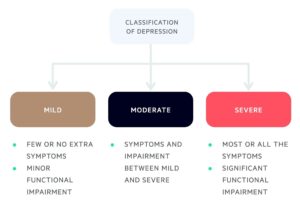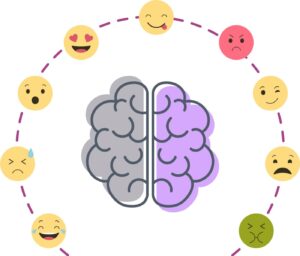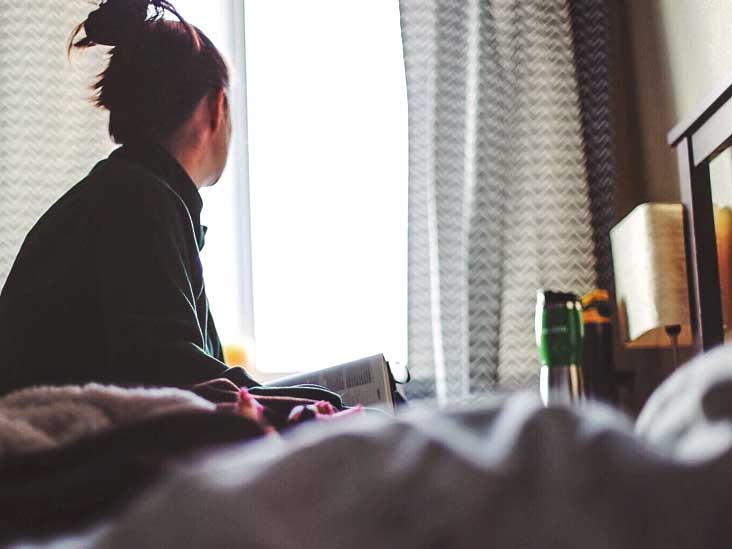Depression is a mental health disorder that affects people in different ways. While some people experience severe depression, others may only experience a mild form of the disorder. This is known as moderate depression. If you are struggling with moderate depression, there are steps that you can take to manage it and improve your quality of life. In this blog post, we will discuss what moderate depression means, and we will provide tips for managing it effectively!
Contents
How Depression Is Classified?
 Depression is a condition defined as a low mood that lasts for at least two weeks. It can be accompanied by a loss of interest in activities, fatigue, changes in sleep or appetite, and feelings of worthlessness or guilt. Depression is classified into four categories:
Depression is a condition defined as a low mood that lasts for at least two weeks. It can be accompanied by a loss of interest in activities, fatigue, changes in sleep or appetite, and feelings of worthlessness or guilt. Depression is classified into four categories:
- Mild
- Moderate
- Severe
- Major
The classification of depression is important because it helps determine the best course of treatment. It also helps predict the likelihood of recovery. For example, people with mild depression are more likely to respond to self-help measures such as exercise and relaxation techniques than those with severe depression.
It is important to remember that depression is a medical condition and not a sign of weakness. With treatment, most people with depression will improve. If you think you may be depressed, talk to your doctor.
How Does Moderate Depression Look Like?
Moderate depression is defined as having symptoms of depression that are not as severe as those seen in major depressive disorder, but still, significantly interfere with daily life. People with moderate depression may experience depressed moods most of the day. And other symptoms that interfere with your daily life.
Let’s take one example where moderate depression significantly interferes with daily life:
You have moderate depression and you’re also struggling with insomnia. This means that your depressive symptoms are preventing you from getting a good night’s sleep. As a result, you’re exhausted during the day, which makes it hard to concentrate at work or school, and difficult to take care of yourself and your responsibilities.
This can create a vicious cycle, as the more you’re unable to function during the day, the more depressed you may feel. In fact, moderate depression can also lead to major depression if left untreated. But there are things you can do to manage your moderate depression and improve your quality of life.
What Are The Common Symptoms?
There are a few common symptoms that come with moderate depression. These are categorized into three categories largely. Let’s discuss it all in a bit more detail.
Emotional
 The emotional symptoms of moderate depression can include:
The emotional symptoms of moderate depression can include:
- Feelings of sadness or emptiness
- Hopelessness
- Irritability or anger
- Anxiety or worry
- Apathy or loss of interest in previously enjoyed activities
These symptoms are usually the most apparent to others. As you can see, they are quite similar to those of mild depression. The main difference is that moderate depression will cause more significant and prolonged problems in your life.
Physical
The physical symptoms of moderate depression can include:
- Fatigue or decreased energy
- Changes in appetite or weight (usually weight loss)
- Sleep problems (insomnia or sleeping too much)
- Physical aches or pains, such as headaches, back pain, or stomach pain
- Restlessness or decreased activity level
Physical symptoms can be difficult to manage because they can lead to a decrease in activity level. When you are feeling fatigued, it can be hard to find the motivation to do anything.
Cognitive
The cognitive symptoms of moderate depression can include:
- Difficulty concentrating or making decisions
- Memory problems
- Indecisiveness
- Guilt or feelings of worthlessness or hopelessness
- Crying spells for no apparent reason
These are some common cognitive symptoms associated with moderate depression. If you are experiencing any of these, it is important to reach out to a mental health professional for help.
Overall, the moderate depression symptoms can make it difficult to function in your everyday life. So you have to be aware of your symptoms and when these symptoms are turning into a bigger problem.
How Moderate Depression Different From Other Types?
 There are different types of depression, each with its own set of symptoms. Major depression is the most severe form, while dysthymia is a milder but more chronic form. Moderate depression falls somewhere in between.
There are different types of depression, each with its own set of symptoms. Major depression is the most severe form, while dysthymia is a milder but more chronic form. Moderate depression falls somewhere in between.
Moderate depression shares many symptoms with major depression, but they are not as intense or debilitating. For example, people with moderate depression may still be able to go to work or school, but they may not be performing as well as usual.
Like major depression, moderate depression can cause physical symptoms such as fatigue, changes in appetite, and insomnia. But again, these symptoms are usually not as severe as major depression.
Moderate depression can last for weeks, months, or even years if left untreated. But with proper treatment, most people with moderate depression will start to feel better within a few weeks. So, first, understand what type of depression you have, and then you can start finding ways to manage it.
How Is It Diagnosed?
The diagnosis of moderate depression is made by a mental health professional using specific criteria. These criteria are found in the Diagnostic and Statistical Manual of Mental Disorders (DSM-IV-TR). There are methods of assessment that may be used, including:
- Hamilton Rating Scale for Depression (HAM-D)
- Beck Depression Inventory (BDI)
The HAM-D is a 17-item scale that assesses the severity of depression. The BDI is a 21-item self-report scale that measures the severity of depression symptoms. A mental health professional will also consider factors such as:
- Duration of symptoms
- Impact of symptoms on functioning
- Presence of other mental health disorders
- Family history of depression
- Response to previous treatment
Moderate depression is diagnosed when an individual has at least five of the nine DSM-IV-TR criteria for major depressive disorder, with at least two or three of the symptoms being present most of the day, nearly every day, for at least two weeks. The symptoms must also cause clinically significant distress or impairment in functioning.
Therefore, with an accurate diagnosis, treatment can be tailored to the individual’s needs. So, contact a professional if you think you may be suffering from moderate depression.
How Can You Manage Moderate Depression?
 Managing moderate depression is possible with the help of a therapist and/or medication. And there are also some things you can do on your own to help manage your depression. Let’s discuss some common treatment options for moderate depression.
Managing moderate depression is possible with the help of a therapist and/or medication. And there are also some things you can do on your own to help manage your depression. Let’s discuss some common treatment options for moderate depression.
See a therapist
One option is to see a therapist. A therapist can help you understand your depression and work with you to develop coping skills. They can also provide support and guidance. If you’re not sure if therapy is right for you, consider talking to a therapist about your concerns.
There are various types of therapy, so you may want to try a few different types to see what works best for you. Some common therapies are:
- Cognitive behavioral therapy (CBT): This type of therapy helps you change negative thought patterns and behaviors.
- Interpersonal therapy (IPT): This type of therapy focuses on your relationships and how they impact your depression.
- Psychodynamic therapy: This type of therapy explores the role of your past experiences in your current depression.
It is important to find a therapist that you feel comfortable with. You should feel safe sharing your thoughts and feelings with them. If you don’t feel like you can open up to your therapist, it may be time to try someone new.***
Consider medication
Another option is to take medication. Medication can help reduce the symptoms of depression and make it easier to cope with your condition. If you’re considering taking medication, be sure to talk to your doctor about the risks and benefits. There are a few different types of medication that can be used to treat depression.
The most common type is antidepressants. Antidepressants work by increasing the levels of certain chemicals in your brain. This can help improve your mood and make it easier to cope with your condition. Other medications include:
- Mood stabilizers
- Antipsychotics
- Anti-anxiety medications
Each type of medication has its own risks and benefits. Be sure to talk to your doctor about which type of medication is right for you.
Join a support group
 Support groups are a great way to share your experiences with others who understand what you’re going through. It can be helpful to talk about your depression and how you’re managing it. You may also find support groups helpful if you’re struggling to find other ways to cope with your depression.
Support groups are a great way to share your experiences with others who understand what you’re going through. It can be helpful to talk about your depression and how you’re managing it. You may also find support groups helpful if you’re struggling to find other ways to cope with your depression.
There are many different types of support groups, so it’s important to find one that’s right for you. You may want to consider a support group that meets in person or online or a group that focuses on specific topics related to depression.
Maintain a healthy lifestyle
A healthy lifestyle is key to managing moderate depression. The self-care activities will help you physically and mentally. Some common lifestyle changes are:
- Eating a balanced diet
- Getting regular exercise
- Avoiding drugs and alcohol
- Getting enough sleep
These lifestyle changes will help improve your mood and mental state. This will help reduce the symptoms of moderate depression. In addition, there are some self-help tips that can help you manage your symptoms. These include:
- Identifying your negative thought patterns
- Challenging your negative thoughts
- Setting realistic goals
- Practicing relaxation techniques
- Talking to your loved ones
So, these are some common tips to help you manage moderate depression. If you are feeling depressed, it is important to talk to your doctor. With these healthy and self-help tips, you can manage moderate depression.
Conclusion
In conclusion, moderate depression is often characterized by feelings of sadness, hopelessness, and fatigue. However, it is important to remember that moderate depression is a treatable condition. If you think you may be suffering from moderate depression, talk to your doctor. With proper treatment, you can manage your symptoms and improve your quality of life.
However, before choosing any treatment, do consult with a professional. They can guide you and provide you with the resources necessary for a full recovery.
For more information and guidance on this condition, please get in touch with our expert therapists at Therapy Mantra. They will be more than happy to assist you on your journey to recovery. Contact us today to learn more about our services. You can also book an online therapy session or download our free Android or iOS app.


